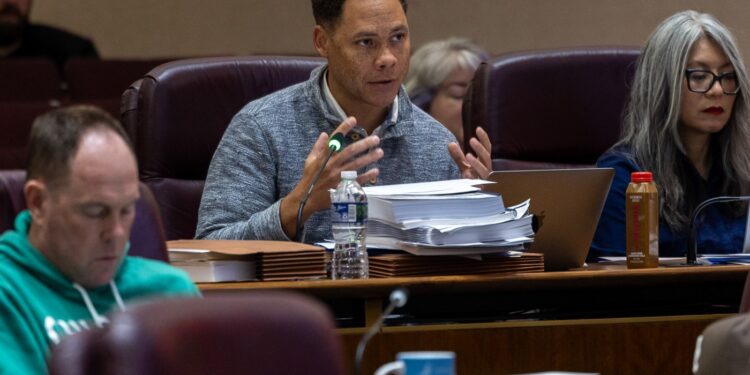
Mayor Brandon Johnson Thursday ripped a proposal Chicago’s top independent watchdog recommended as a way to prevent him and future mayors from impeding investigations by her office.
The mayor’s criticism of the ordinance came a day after his close ally, Ald. Byron Sigcho-Lopez, stalled it when it was introduced to the City Council.
The legislation matched recommendations Inspector General Deborah Witzburg made in a recent letter to aldermen as she criticized the mayor-controlled Law Department for hindering investigations that “may result in embarrassment or political consequences to City leaders.”
Witzburg said the Law Department has selectively slow-walked compliance with inspector general subpoenas. She asked aldermen to change city law to clearly eliminate the department’s discretion over subpoena enforcement.
But when Ald. Matt Martin, the City Council’s Ethics Committee chair, introduced legislation to do that on Wednesday, Sigcho-Lopez sent it to the Rules Committee — which is where mayors and their allies often ship legislation they oppose to languish.
Johnson’s administration marked its clear opposition to Martin’s proposal Thursday, saying in a statement, “this ordinance is not an ethics reform ordinance.”
“The proposed ordinance is legally deficient on its face and requires further scrutiny in the Rules Committee where it can be properly vetted and analyzed,” Johnson press secretary Cassio Mendoza wrote. The package appears to conflict with state law, city code and Illinois Supreme Court precedent, he added.
Witzburg called the claim that the ordinance needed to be delayed “disingenuous” Thursday. Her office has long sought the change, even pushing for it when Lori Lightfoot was mayor and with Johnson’s transition team, she told the Tribune.
“And the place to have the discussion on the merits of a proposed ordinance is in a hearing on that ordinance in the Ethics Committee,” Witzburg added. “I would welcome a conversation on the merits of this ordinance.”
Sigcho-Lopez, 25th, told the Tribune Wednesday that he “strongly [believes] in Ethics Reform,” but said he stalled the measure because he thought it needed more participation from others. The Southwest Side alderman said he understood that there had been no conversation about the ordinance between Martin and Johnson’s team.
“Sometimes people are taking measures without even talking to the administration, talking to the inspector general. I do think those meetings need to happen before we introduce items just with the whole purpose of make it into the news or attack, you know, politically,” Sigcho-Lopez said.
Martin said he spoke with members of the Law Department and Johnson’s office about the ordinance before Wednesday, but has not discussed it with Sigcho-Lopez.
“It’s disappointing, but not new when an alderman uses parliamentary tactics to delay ethics reform. I remain undeterred,” Martin said.
Witzburg’s letter detailing the Law Department’s alleged impediment of investigations, first reported by the policy team at the Better Government Association, said the department also withholds records by asserting undue attorney-client privilege and demands top mayoral lawyers be allowed to attend confidential investigative interviews.
The ordinance from Martin, 47th, matched the letter by seeking to block city attorneys from representing people in investigative meetings and making the duty for city workers to cooperate with the inspector general “supersede any claim of privilege.”
Responding to the letter last week, city Law Department spokesperson Kristen Cabanban said that “for the past three decades, previous City inspector generals have properly accepted that the legal rights of City employees and the legal interests of the City rightfully justify our practices.”
Johnson’s responses to ethics reform are starting to look “like outright hostility,” BGA Policy Vice President Byran Zarou wrote in a statement Thursday. Zarou called on the City Council to pass Witzburg’s proposal.
“Administrations tell us who they are by what they prioritize and what they obstruct,” Zarou wrote. “Mayor Johnson and his allies have consistently and repeatedly obstructed even the smallest ethics reform measures.”
Another Ethics Committee reform championed by Martin was sidelined in June. Martin sought to codify an executive order implemented by former Mayor Rahm Emanuel in 2011 that restricted lobbyist donations to Chicago mayoral candidates. Several donations to Johnson appeared to violate the order, but the city’s Board of Ethics determined Emanuel’s rule was not enforceable.
Ald. Chris Taliaferro, 29th, and Ald. Nick Sposato, 38th, used the “defer and publish” maneuver to forestall what would have been a final floor vote. But the ordinance finally passed unanimously in September after Johnson dropped his opposition.
A late January report from Witzburg blasted the city’s mayors for failing to properly log gifts and Johnson for blocking public access to the room where gifts are stored. Johnson posted an updated log online last week and released a 20-second video of the “gift room” that he argued amounts to public access. At the time, Witzburg said the planned quarterly videos are “not a substitute for public access to public property.”
Witzburg said Thursday the “independence and effectiveness” of inspectors general are under attack across the country. She plans to continue to push for the change despite the delay, she said.
“The independence of oversight must be protected. That is a basic foundation of good government,” Witzburg said. “City Hall does not get to choose who can be investigated and who is protected from accountability.”
The City Council’s Rules Committee is likely to meet soon in an attempt to rescue a similarly-stalled top Johnson priority: a plan to help spur sustainable, affordable housing with a unique $135 million revolving loan fund. Aldermen are able to take an item outside of the committee if it has not been considered for two months.
Also this week, aldermen approved the first phase of development for the 15-year, $7 billion “1901 Project” plan to redevelop the area around the United Center. The vote marks a critical step toward construction for the project that could eventually bring nearly 10,000 new homes, a 6,000-seat music hall, a boutique hotel and around 10 acres of green space to the area around the arena now mostly made up of parking lots.
Originally Published:






